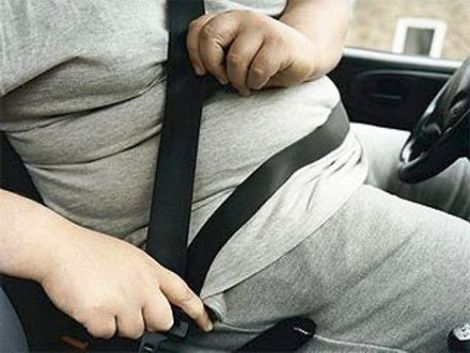As it turns out, if you’re obese, cholesterol and heart attacks aren’t the only things to watch out for. You are also more likely to die in a car accident.
The University of Buffalo has just released its study of fatal accidents which reveals that if you are obese, you are 21 percent more likely to die of your injuries in a car accident. If you are morbidly obese, that number rises to a whopping 56 percent.
“The severity and patterns of crash injuries depend on a complex interaction of biomechanical factors, including deceleration velocity at impact, seat belt and air bag use, vehicle type and weight, and type of impact,” says Dr. Dietrich Jehle.
The population’s obesity levels are rising at an alarming rate, particularly in North America, so what does Jekle suggest?
“Crash test dummies have saved lives and provided invaluable data on how human bodies react to crashes, but they are designed to represent normal-weight individuals. If they represented our overweight American society, there could be further improvements in vehicle design that could decrease mortality.”
Jehle goes on to recommend that “moderately and morbidly obese individuals to buy larger vehicles with more space between the seat and the steering column”.
While I agree that people in general should leave more space between themselves and the steering column, I feel as though this suggestion just goes along with the uncorrect stigma that “bigger is better”, which is already a huge problem in the automotive industry. If you conduct a very unscientific poll of why people buy massive SUV’s for instance, a lot of people will tell you that they bought them to feel safe. However, feeling safe and actually being safe or two diffent things entirely. Statistics have proven time and time again that just because your vehicle is bigger, it doesn’t mean it’s safer and with SUV’s in particular, it often means they are less safe due to their weight and ride height, making them more likely to lose control or roll over. So recommending that an obese indiviual buy a bigger car only means they’ll be more likely to get into an accident in the first place, which then means that the accident is more likely to be fatal.
As such, the study’s recommendation is largely reactive, as opposed to proactive, of the bigger problem. It did not mention anything about encouraging healthy eating habits or exercise for instance.
The study used drivers who were grouped based on body mass index (BMI) — weight in kilograms divided by height in meters squared — into underweight, normal, overweight, slightly obese, moderately obese and morbidly obese categories from accident data between 2000 and 2005.
Thoughts?


